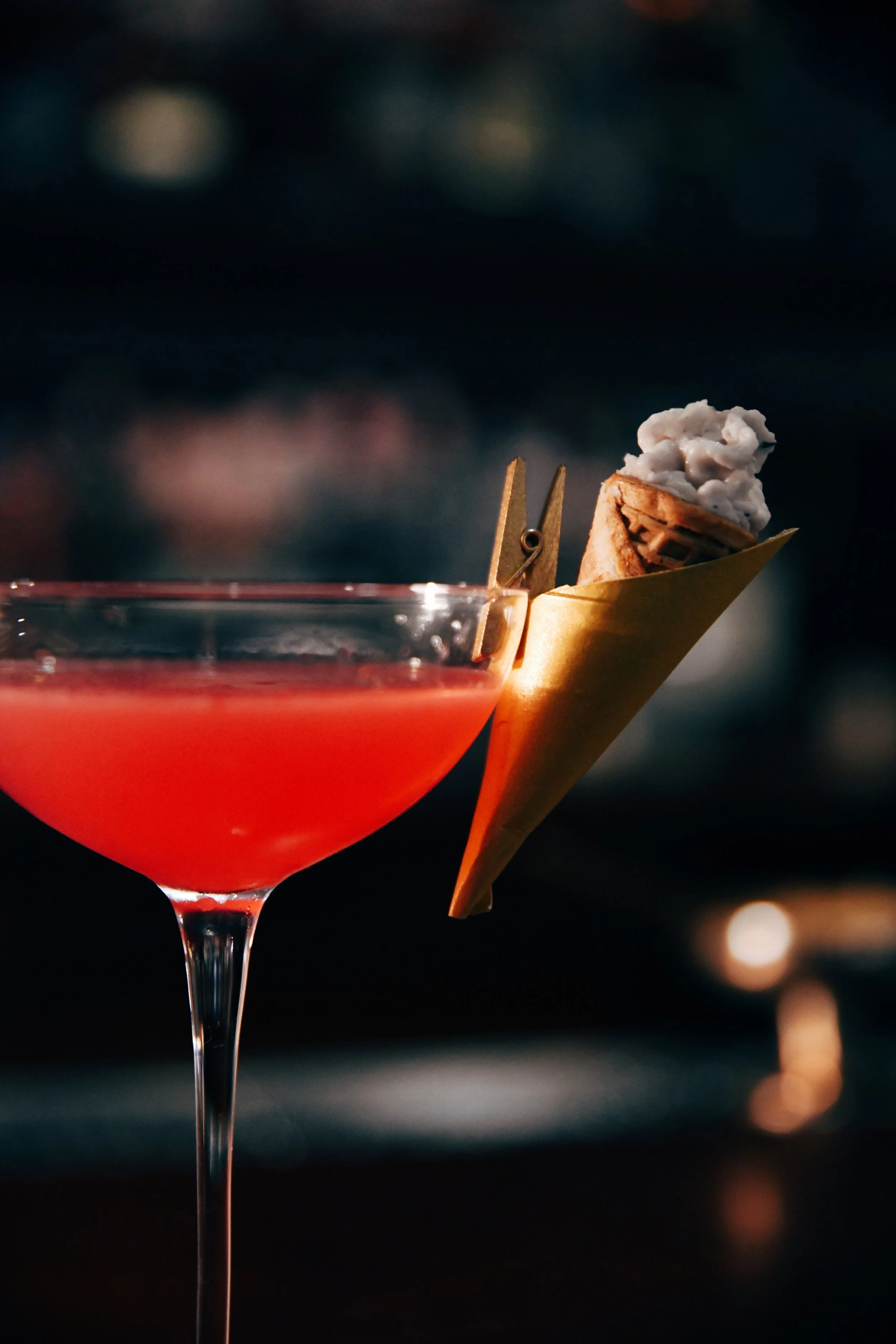Around Town: Ashley Bare
In her new series, Food Editor Grace Pritchett shares a drink or two and a bite to eat with some of KC’s most prominent food personalities– and shares the insights and good times with us!
Ashley Bare. Photo by Cameron Gee
Ashley Bare is a Kansas City native who should definitely be your next travel buddy. Ashley started her career at Houston’s on the Plaza at age 17 before living and cooking her way through France, Switzerland, and New York City. Now, she finds herself back in Kansas City with the hopes of getting everyone out of their comfort zones through her multi-course cooking classes. Just don’t ask her what’s for dessert. Ashley also creates stunning and creative food spreads for small events. Keep an eye out for her creations in brick and mortar spots!
I sat down with Ashley at her favorite restaurant in town, Waldo Thai, to talk freelance, teaching moments, and honesty.
Photo by Alyssa Broadus
What first got you interested in food?
Both my parents are quite good at cooking. My mom is Chinese so I was surrounded by a lot of Asian cuisine growing up. I love Asian cuisine and I'm highly influenced by it. I grew up eating a lot of "weird" stuff, like stuff that other kids weren't eating, and I had no choice but to eat everything put in front of me.
I definitely wasn't encouraged to cook for a living by any means. My parents were both physicians and expected me to go the route of doctor or lawyer, but they’re so supportive of me now.
When did you start to consider food and hospitality as a career?
I have memories of my friends in high school telling me to go to culinary school but it really didn't stick until after college. I graduated with a Bachelor's in French and Art History and decided to go to culinary school. I had it in the back of my head like, this is what I’m really interested in.
And everyone in your life telling you to do it.
Exactly. So, I graduated from college and was putting off adulting, so I went to Switzerland to be an au pair. And it was 2009, the economy was shit and I had a degree in French and Art History - like, what else was I going to do? Part of my job as an au pair was to cook for the family, and they were also telling me that I should be doing this as a career.
I spent that year in Switzerland trying to decide what path I wanted to take. Ultimately, I moved to New York City and went to culinary school.
It's definitely hard to wrap your mind around the more unique and different ways to be part of this industry when you haven't been encouraged to go this route. I was resistant to it for so long because I wasn't sure if it was viable to be a traditional restaurant chef. It took some time to figure out how to cook for a living in a way that satisfies me.
It's hard when you think about taking risks and doing what you really love, but you have that voice of your parents in the back of your head like, how will you get money?
My parents just can't wrap their heads around my freelance lifestyle. They didn't encourage me to think about my work in a creative way, so they have a hard time approaching my work now.
Photo by Alyssa Broadus
I feel like I run into so many people who know I'm a freelancer and they say, do you have a job yet? And I'm like, I have multiple jobs!
Exactly! I tell people I'm a chef and they ask what restaurant I'm with. For some reason, it needs to be attached to a restaurant to be a real thing.
Even with being so resistant to this industry, you seem to be someone who has taken a lot of jumps and risks in the process. Have you always been like that?
I would say I have been resistant to traditional routes of work within this industry, for myself personally. I’m not resistant to this industry as a whole; I really love this industry. But yeah, I love jumps and risks.
I've always been someone who wants to get out in the world and go everywhere. This is my first time living back in Kansas City in ten years. I finished my undergraduate degree at KU, but I actually started at Colby College in Maine. They have a French program where you spend your first semester of college in France. I ended up staying for two semesters, there may have been a boy involved, but it was a fantastic decision for my current career path.
How did you get into being a freelance chef?
I've always been a "yes" person and while I was in New York, I was taking everything that came my way, whether I had experience in it or not. I was teaching cooking classes at Haven's Kitchen in Chelsea and got a lot of private chef, small event, and cookbook work from the connections I made there. That really propelled me into the industry in a freelance kind of way. I know what my skillset is, so I'm happy to take on things that fit and be completely honest if it is my first time doing that job or task.
Is there anything you can't do?
I know the best work that I do is in person. So if I'm doing recipe research and development, I'm not good at long-distance work. I'm good at being realistic and being honest with myself, so I know what I can handle. I believe I can cook almost anything really, really, well, minus desserts and baking.
Ooooh, I find it so interesting to meet people who don't have baking in their skill set.
I can't bake. I'm an intuitive cook, I don't work from recipes. I eyeball everything and you can't do that in baking. But I can cook the shit out of some non-baked goods!
I appreciate that point of view because I see a lot of people facing imposter syndrome and struggling with what they're good at.
It takes a certain honesty with yourself and some people have a hard time facing that in their lives. I try to be honest with myself as much as possible. I know what I'm bad at. When - and if - I have a brick and mortar empire, I will need tremendous help from other people. I am very entrepreneurial but I know someone will have to do my finances.
Photo by Ashley Bare
What's the process behind your cooking classes?
The objective of all of my classes is that you can do this at home. There's no reason to be intimidated by cooking so I want people to walk away feeling confident in their abilities.
Then I focus on teaching moments. I like dishes that are adaptable and can handle substitutions. Teaching comes from a place of being comfortable with your subject matter and wanting others to be comfortable with it. I know anyone can feel comfortable with cooking; you just have to get over these little hurdles to get there.
Especially with a topic like cooking where the students can see their progress in front of them. Like, look what you did!
I love watching people make things and go through that process. It’s so fun to see!
Where do you teach your cooking classes?
I cook all over the city - a lot at Olive Tree in Overland Park and a lot of private, in-home classes. But I'm about to start working with Robin Krause at Billie's Grocery. Billie’s Grocery will be a full-service restaurant, opening soon. Robin is putting in an event space and an instructional kitchen and I will be heading up all the events and curriculum there. It's a new role for me, getting to spearhead the curriculum, but I had to say yes. I love her and what she's done with Unbakery.
There's a lot of great people in Kansas City. That's something I've really enjoyed here that I didn't expect to find. It's genuine support of one another. Like, “You might be my competition but I want you to do well. Just like I hope you want me to do well and let's get there together.”
What do you hope for the future of your industry?
I think it's an attractive industry for a lot of people, but I would like to see the industry maintain that attraction and grow. One of my least favorite questions for servers is "what do you do in real life?" I hate it.
I mean, this is real life.
This is real life and this is a fully appropriate job. Why are we treating the service industry as a secondary position?
Or like a job meant for high schoolers.
Yeah, there are people who are career servers and that's totally fine. I think people should earn fair wages in the hospitality industry. Like including the tip in the cost of the meal and fairly paying your back of house staff. Back of house people are some of the hardest working people and you don't see it.
I think the best people work in hospitality, so I hope we continue to attract the best people to this industry.











